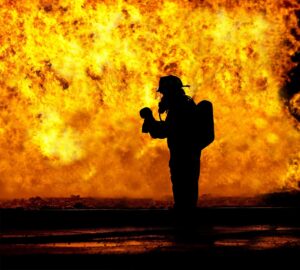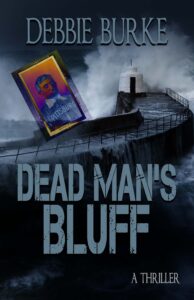By Debbie Burke
How characters act under stress is one of the best techniques to show what they’re made of.

Photo credit: Lisa Brewster, CC-BY-SA 2.0
If there’s a minor hiccup in their routine, do they take it in stride or become a drama llama?

When life delivers an unexpected setback, do they pick themselves up, dust themselves off, and make a new plan? Or do they stand around wondering “why me”?

Photo credit: Pixabay
A catastrophe threatens their lives or the lives of others. Do they freeze, flee, or run toward the disaster?
Whether large or small, a crisis brings out new aspects of the character’s personality, thought processes, emotional reactions, strengths, and weaknesses.
Are they courageous? Cowardly? Indecisive? Altruistic? Sneaky? Conniving? Manipulative? Driven by selfish interests?
Do they take charge and tackle the problem head on? Or do they avoid it until forced to face it?
Recently I ran across a 1980 book by Terrence Des Pres entitled: The Survivor-An Anatomy of Life in the Death Camps. He did extensive research, studying the differing reactions of people who survived the Holocaust vs. those who didn’t.
In the introduction, he wrote:
“It turns out that survival is an experience with a definite structure, neither random nor regressive nor amoral. The aim of this book has been to make that structure visible.”
Two of his conclusions were startling.
First, newly arrived prisoners had the highest death rate.
Second, criminals had the highest survival rate.
Why?
Newcomers often froze. They went into shock and denial. They couldn’t adjust physically, mentally, or psychologically to their horrifying new circumstances. That paralysis and inability to adapt led to high death rates.
Criminals, on the other hand, adapted better and survived at a higher rate. Because they were used to living outside of society’s rules and norms, they changed their behavior more easily to avoid being caught in the daily dangers of the camps.
How do your characters handle stress? Do they freeze and withdraw? Do they pivot in a new direction? Do they react impulsively? Do they make a rational plan to overcome difficulty? Do they wait/hope for someone else to solve the problem? Do they seek guidance or cooperation from others, or are they lone wolves? Do they manipulate the situation to their advantage?
Here’s an unscientific quiz to test the mettle of characters in your WIP. The questions range from trivial annoyances to life-or-death disasters.
How characters react to small problems may indicate how they treat more serious trials.
Or not. A character who appears fragile or weak on the surface may rise up to show hidden strengths or talents.
Try running all your major characters through the quiz—protagonist and antagonist, as well as secondary characters who play important roles like partners, love interests, family, coworkers, mentors, etc. See what each one does. Discover what conclusions you can draw from their behavior.
There are no right or wrong, good or bad answers. The only meaningful answer is whether a character’s reaction is authentic and true to their personality.
Question #1 – Your character runs out of shampoo in the shower. What does s/he do?
- Screams for someone else to bring more shampoo.
- Uses soap instead even though it leaves hair greasy.
- Says screw it and finishes with water only.
- Wraps up in a towel and drips down the hall to find more shampoo.
- Fill in a different answer.
Question #2 – In a remote location without cell service, your character’s car doesn’t start. The only other vehicle around is a stick shift, which your character never learned to drive. What does s/he do?
- Tries to call Triple A, hoping for a signal.
- Tinkers under the hood to try to start it.
- Starts walking.
- Drives the unfamiliar vehicle, even though the gears grind.
- Remains in the broken-down car with windows up and doors locked.
- Jacks the first car that comes along.
- Fill in a different answer.
Question #3 – Your character lands in a foreign country and doesn’t speak the language. Luggage is lost and a pickpocket steals passport, credit cards, and cash. What does s/he do?
- Screams at airport employees.
- Tackles the thief and beats the snot out of them. And is probably arrested.
- Uses sign language to report thefts to the authorities.
- Contacts the embassy or consulate for help.
- Hopes a sympathetic stranger feels sorry enough to offer assistance.
- Fill in a different answer.
Question #4 – The electricity goes off and there’s no cell service. What does your character do?
- Starts up the generator that s/he bought to prepare for this contingency and proceeds with normal activities.
- Ambushes the prepper neighbor who has the generator and takes it away from them.
- Reads a book by candlelight and thinks “Gee, this is kinda romantic.”
- Hyperventilates. Alternatively, hides under the bed so the bogey man can’t get him/her.
- Goes searching for missing family and friends.
- Seizes this golden opportunity to commit crimes b/c the chances of getting caught or punished are low.
- Fill in a different answer.
Question #5 – The house/apartment catches fire. What does your character do?
- Grabs the already-packed bug-out bag which contains medications, passport, flashdrive backups, and cash.
- Grabs loved ones and pets and runs like hell.
- Grabs a fire extinguisher and fights the blaze.
- Stands and watches because s/he just dropped acid and is enjoying the far-out colors, man.
- Shoves an abusive partner into the flames, slams and locks the door, and runs like hell.
- Fill in a different answer.
Question #6 – Your character’s spouse and child are drowning. S/he can only save one. What does your character do?
- Saves the child.
- Saves the spouse.
- Saves the closest one.
- The decision is too impossible to fathom so they all drown together.
- Prays for a miracle.
- Drowns themselves b/c they can’t live with the guilt.
- Fill in a different answer.
Question #7 – Your character is facing death with no possible reprieve and no way out. What does s/he do?
- Prays.
- Requests a blindfold and a last cigarette.
- Weeps.
- Sends a last message to loved ones.
- Shivers with terror.
- Takes down as many enemies as possible.
- Screams, “This can’t be happening!”
- Fill in a different answer.
Did you learn more about your characters?
Do these insights help your story? Drive it in a new direction?
In a sad, ironic footnote, author Terrence Des Pres died at age 47 by hanging, his death ruled “accidental” by the Madison County (NY) medical examiner’s office.
~~~
TKZers: Please share “different answers” you filled in.
~~~
By book #4 in the Tawny Lindholm Thriller series, I thought I knew the two main characters well. But I learned surprising new facets when they are caught in Hurricane Irma in Dead Man’s Bluff. Stranded in an unfamiliar, flooded Florida landscape without electricity, they must hunt for a missing friend. Soon they discover predators, animal and human, are hunting for them.
Special price today only $.99.


Loved putting my protagonist through this quiz! Thanks so much Debbie.
You’re very welcome, Linda. It’s always fun to discover new facets of characters, esp. ones we think we know well.
Excellent post, Debbie. A great way to get acquainted with our characters or develop them.
I found it interesting that as I went through the questions I first asked myself how I would respond. I guess that says something about me.
Did you create this questionnaire, was it from the Terrence Des Pres book, or from another source? I really like how the questions strike to the core of the character.
Have a great week!
Thanks, Steve.
I created the questions from the most troubling situations I could imagine. Examples came from books, movies, plays, and real life. Sophie’s Choice was one.
Wishing you a productive week!
Those are great questions, Debbie. And now you have a new question to add to your list: “What would your character do if “he” forgot to set a sale price to coincide with a blog?”
Have a great day!
Someone forgot to set the sale price for Dead Man’s Bluff.
That Someone is now:
a. Hanging head in shame.
b. Scrambling to correct the oversight.
c. Sulking in the corner after being scolded.
d. Foisting the blame onto a sloppy marketing administrator who exists only in her imagination.
e. Fill in a different answer.
Apologies and please check back later.
Such an easy mistake to make, Debbie! Hopefully it will be updated to the sale price ASAP.
Back in November 2016, I sent out my first email to the newsletter I’d been building up since that August, and sent the wrong link for a free read, not once, but *twice*, so I can relate.
Glad I’m not alone, Dale! Thanks. Just checked and the $.99 price is now shown.
Thought-provoking questions, Debbie. Like Steve, I answered them first as I would, then went back and answered them as Meg. The easiest question to answer was what to do during a power outage—read a book by candlelight. Meg would do that in a heartbeat, and I *have* done that on more than one occasion 🙂
The hardest question is the drowning version of the lifeboat/trolley problem. I hated that scenario when we tackled in class in school, and would try and find another solution then and now. So would Meg, though she’d save the child if there was no true alternative to the choices.
Hope you have a wonderful week. Happy writing!
Dale, Meg’s answer made me smile. Not only that, Meg might hope the blackout lasts as long as she has candles or flashlight batteries.
Questions where the answers are all horrible are the worst. Hope I’m never in that position.
Thanks for sharing your answers, Dale.
Pretty cool seeing you on a Monday. I try to be different with my characters. I plan a long game in most cases (a series of books) and see evolution and regression progression.
Ben, playing the long game with series characters is different b/c the author and readers get to know them over an extended period of time. “Evolution and regression progression” is a great way to describe the changes that continuing characters undergo from book to book.
Thanks for stopping by.
This is great, Debbie!
I looked at all 7 questions through the eyes of the MC in No Tomorrows, releasing on 10/1.
It was the 7th question that I/she was able to answer immediately. (Note the title of the novel…of course.)
Other: she tightens her grip on life in the only way she knows how.
Sorry, can’t tell you the details… 🙂
Deb, since #7 is the theme of your book, thanks for sharing your character’s answer. It does a good job of raising more questions for the reader. How does she tighten her grip? Does that solution save her or doom her?
Best wishes for a successful launch!
intriguing questions, Debbie. Thanks for another useful blog.
Elaine
Glad you enjoyed it, Elaine. Your mishaps last May would challenge the most heroic character! http://killzoneblog.com/2023/05/good-luck-and-good-advice.html
Interesting post, Debbie. I’ve already subjected characters to some of these scenarios. Here’s one:
In Finding Sarah, Sarah is trying to escape her kidnapper, and after thinking she’s knocked him out for the count, she grabs his car keys. His car is parked facing a tree, and it’s a stick shift. She hears her name being called. Her bad guy didn’t stay unconscious very long. She finds his phone in the glove box, grabs it and runs, hoping to get somewhere there’s a signal.
Terry, you put poor Sarah through the grinder and your readers love every minute following her setbacks and how she overcomes them.
Great list of questions, Debbie. Maybe you should start your own personality evaluation company.
Like Steve, I asked myself what I would do in each situation. I actually had a situation similar to Question #3. We were in Rome, my husband was at a meeting, and our son and I were walking down a street in the city when I was pickpocketed. By children! They managed to get my wallet (money, drivers license, credit cards) out of my purse without my knowing it. Fortunately, my passport was in the hotel safe. When the kids suddenly disappeared, I realized my purse was lighter than it should have been. I ran to a policeman who was directing traffic nearby. I managed to explain to him in sign language what had happened. He then managed to explain to me that he only directed traffic, and I would have to go to the police station to report the crime. (We did. Nothing happened.)
Question #3a: What would you do if you caught the children who pickpocketed you? I refuse to answer that question on the grounds that I’m not supposed to admit to having violent thoughts. 🙂
Great post. Thanks for stepping in for me today.
Kay, admissions made at TKZ can’t be used against you! Hope the pint-size criminals didn’t ruin your trip.
Happy to swap days anytime.